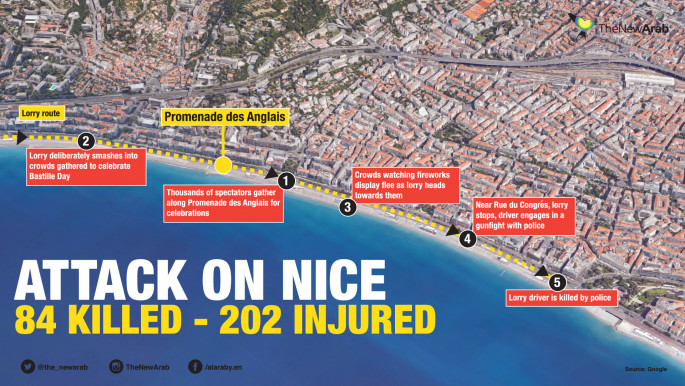France Bastille Day attacker formally identified by police
The driver of the truck that smashed into a crowd watching fireworks in the French Riviera city of Nice, killing at least 84, has been formally identified, police sources said on Friday.
Identity papers of 31-year-old Franco-Tunisian Mohamed Lahouaiej-Bouhlel were found in the vehicle after the attack on France's 14 July national holiday.
His neighbours described him as a loner with no visible religious affiliation, as forensic experts searched his flat.
They portrayed him as a solitary figure who rarely spoke and did not even return greetings when their paths crossed in the four-storey block, located in a working-class neighbourhood of Nice.
Sebastien, a neighbour who spoke to AFP on condition that his full name was not used, said Lahouaiej-Bouhlel did not seem overtly religious, often dressed in shorts and sometimes wore work boots.
He had a van parked nearby and owned a bike, which he brought up into his first-floor apartment.
Of those who were interviewed, only one, a neighbour on the ground floor, said she had had any concerns about him -- he was "a good-looking man who kept giving my two daughters the eye".
Police investigators and forensic experts entered his apartment around 9.30am (0730 GMT) with an armed police intervention unit in support, and brought out bags of material later.
Police shot the driver dead after he drove the truck two kilometres (1.3 miles) through a crowd along the palm-lined Promenade des Anglais.
Interior ministry spokesman Pierre-Henry Brandet said 84 people were killed and scores injured, including 18 in "critical condition".
Shortly after the attack, France's Prime Minister declared three days of national mourning starting Saturday.
 |
Neighbours of 31-year-old Franco-Tunisian Mohamed Lahouaiej-Bouhlel described him as a loner with no visible religious affiliation. |  |
Manuel Valls also told reporters that flags would be flown at half-mast from Friday, and a law extending increased powers for the police will be put before parliament next week.
"Times have changed, and France is going to have to live with terrorism, and we must face this together and show our collective sang-froid," he said.
"France is a great country and a great democracy and we will not allow ourselves to be destabilised," he added.
"We want to bring the French nation together. The only dignified response (to the attack) is for France to stick with the spirit of July 14, a France that is united around its values."
The attack targeted Bastille Day, the country's national holiday that marks the start of the French Revolution in 1789.
It is a celebration of France's secular republic and the values of "Liberte, Egalite, Fraternite" (Freedom, Equality, Fraternity).
Earlier on Thursday, thousands of people had gathered in Paris to watch the traditional Bastille Day military parade and fireworks displays were held across France.
'Horrific terrorist attack'
World leaders rushed to condemn the bloodshed, with US President Barack Obama blasting "what appears to be a horrific terrorist attack".
The attack was the third major strike against France in less than 18 months and prosecutors said anti-terrorist investigators were handling the probe.
It comes eight months after Islamic State (IS) gunmen and suicide bombers attacked bars, restaurants, a concert hall and the national stadium in Paris, killing 130 people.
Since then, France has been under a state of emergency, which French President Francois Hollande announced would be extended for three months in the wake of this latest attack.
The government would also "step up" its action against IS targets in Syria and Iraq, he said.
"We will continue striking those who attack us on our own soil," he said.
He also called up army reservists to bolster security services that are stretched to the limit.
IS has repeatedly singled out France as a prime target for its military action against the group in Iraq and Syria, and hundreds of extremists have left France to fight in its ranks.
 |





 Follow the Middle East's top stories in English at The New Arab on Google News
Follow the Middle East's top stories in English at The New Arab on Google News
![The UAE is widely suspected of arming the RSF militia [Getty]](/sites/default/files/styles/image_330x185/public/2024-11/GettyImages-472529908.jpg?h=69f2b9d0&itok=Yauw3YTG)
![Netanyahu furiously denounced the ICC [Getty]](/sites/default/files/styles/image_330x185/public/2024-11/GettyImages-2169352575.jpg?h=199d8c1f&itok=-vRiruf5)
![Both Hamas and the Palestinian Authority welcomed the ICC arrest warrants [Getty]](/sites/default/files/styles/image_330x185/public/2024-11/GettyImages-2178351173.jpg?h=199d8c1f&itok=TV858iVg)